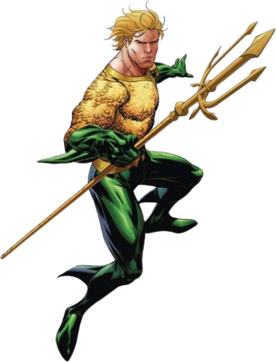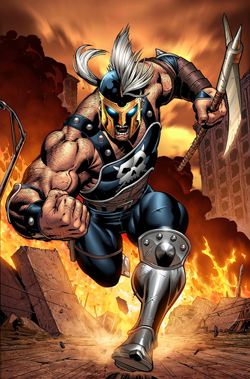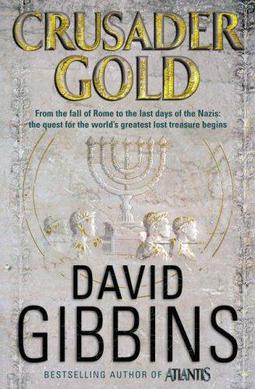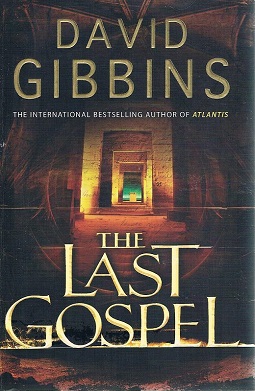
Atlantis is a fictional island mentioned in Plato's works Timaeus and Critias as part of an allegory on the hubris of nations. In the story, Atlantis is described as a naval empire that ruled all Western parts of the known world, making it the literary counter-image of the Achaemenid Empire. After an ill-fated attempt to conquer "Ancient Athens," Atlantis falls out of favor with the deities and submerges into the Atlantic Ocean. Since Plato describes Athens as resembling his ideal state in the Republic, the Atlantis story is meant to bear witness to the superiority of his concept of a state.

Indiana Jones and the Fate of Atlantis is a point-and-click adventure game developed and published by LucasArts and released in June 1992 for Amiga, DOS, and Macintosh. Almost a year later, it was reissued on CD-ROM as an enhanced "talkie" edition with full voice acting and digitized sound effects. The seventh game to use the script language SCUMM, Fate of Atlantis has the player explore environments and interact with objects and characters by using commands constructed with predetermined verbs. It features three unique paths to select, influencing story development, gameplay and puzzles. The game used an updated SCUMM engine and required a 286-based PC, although it still runs as a real-mode DOS application. The CD talkie version required EMS memory enabled to load the voice data.

Aquaman is a superhero appearing in American comic books published by DC Comics. Created by Paul Norris and Mort Weisinger, the character debuted in More Fun Comics #73. Initially a backup feature in DC's anthology titles, Aquaman later starred in several volumes of a solo comic book series. During the late 1950s and 1960s superhero-revival period known as the Silver Age, he was a founding member of the Justice League. In the 1990s Modern Age, writers interpreted Aquaman's character more seriously, with storylines depicting the weight of his role as king of Atlantis.

Graham Bruce Hancock is a British writer who promotes pseudoscientific theories involving ancient civilizations and hypothetical lost lands. Hancock speculates that an advanced ice age civilization with spiritual technology was destroyed in a cataclysm, but that its survivors passed on their knowledge to hunter-gatherers, giving rise to the earliest known civilizations of ancient Egypt, Mesopotamia, and Mesoamerica.
Critias, one of Plato's late dialogues, recounts the story of the mighty island kingdom Atlantis and its attempt to conquer Athens, which failed due to the ordered society of the Athenians. Critias is the second of a projected trilogy of dialogues, preceded by Timaeus and followed by Hermocrates. The latter was possibly never written and the ending to Critias has been lost. Because of their resemblance, modern classicists occasionally combine both Timaeus and Critias as Timaeus-Critias.

Atlantis: The Antediluvian World is a pseudoarchaeological book published in 1882 by Minnesota populist politician Ignatius L. Donnelly. Donnelly considered Plato's account of Atlantis as largely factual and suggested that all known ancient civilizations were descended from this lost land through a process of hyperdiffusionism.

The mythology of the Stargate franchise is a complex and eclectic fictional backstory, which is presented as being historical, of the Stargate premise. A "rich mythology and world-building" are used to establish "a vast cosmology and an interesting alternate take on the history of Earth"; a defining feature is "its use of ancient mythology, with stories that take inspiration from multiple places around the globe". Narratives center around xeno-mythology as experienced by humans during episodic contact with alien races. Audiences across a variety of platforms - including TV series, novels, comics and movies - witness the people of Earth exploring a fictional universe using the Stargate. Species established early on in the franchise recur throughout, with one adversary often dominating a particular story arc, which can continue across several seasons.

Fingerprints of the Gods: The Evidence of Earth's Lost Civilization is a 1995 pseudoarcheology book by British writer Graham Hancock, which contends that an advanced civilization existed in prehistory, one which served as the common progenitor civilization to all subsequent known ancient historical ones. The author proposes that sometime around the end of the last ice age this civilization ended in cataclysm, but passed on to its inheritors profound knowledge of such things as astronomy, architecture and mathematics.

The legendary island of Atlantis has often been depicted in literature, television shows, films and works of popular culture.
David Gibbins is an underwater archaeologist and a bestselling novelist.

Ares is a fictional character, a deity appearing in American comic books published by Marvel Comics. The character is based on the Greek god of the same name. He first appeared in Thor #129 and was created by Stan Lee and Jack Kirby. Ares has commonly appeared as an enemy of Thor and Hercules, starring in his own self-titled series in 2006.

Neptune, also called Poseidon, is a fictional character appearing in American comic books published by Marvel Comics. The character is based on the Roman God with the same name and his Greek counterpart. Neptune is the god of the sea in the Olympian pantheon, as well as patron god over Atlantis. Neptune first appeared in Tales to Astonish #70 and was adapted by Stan Lee and Gene Colan.
Alan F. Alford, was a British writer and speaker on the subjects of ancient religion, mythology, and Egyptology.

Ancient astronauts have been addressed frequently in science fiction and horror fiction. Occurrences in the genres include:

White gods is the pseudoscientific belief that ancient cultures around the world were visited by white races in ancient times, and that they were known as "white gods".

Atlantis is an archaeological adventure novel by David Gibbins. First published in 2005, it is the first book in Gibbins's Jack Howard series. It has been published in 30 languages and has sold over a million copies, and is the basis for a TV miniseries currently in development.

Crusader Gold is an archaeological adventure novel by David Gibbins. First published in 2006, it is the second book in Gibbins's Jack Howard series. It has been published in more than 20 languages and was a New York Times bestseller.

The Last Gospel is an archaeological adventure novel by David Gibbins. First published in 2008, it is the third book in Gibbins' Jack Howard series. It has been published in more than 20 languages and was a London Sunday Times top-ten bestseller and a New York Times top-ten bestseller.

The Tiger Warrior is an archaeological adventure novel by David Gibbins. First published in 2009, it is the fourth book in Gibbins' Jack Howard series. It has been published in 18 languages and was a New York Times bestseller.
















